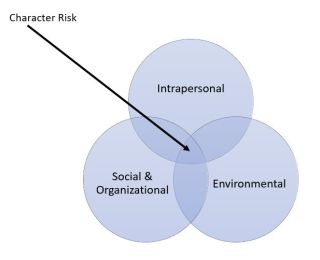KEY POINTS
- Good character is associated with productive and meaningful lives.
- Understanding common threats to positive character helps mitigate against character failures.
- Three models of character failure provide a roadmap for avoiding character pitfalls.
Positive character is essential to a life well lived. People who are strong in the moral virtues of wisdom, courage, justice, humanity, temperance, and transcendence form stronger and better social bonds, perform better at their jobs, and are more resilient in the face of adversity. They are trusted and respected by others and live lives of meaning and purpose.
The Importance of Self-Reflection
But even the best people sometimes fail at character. With honest self-reflection, we all can recall instances where we were not honest, courageous, kind, fair to others, or prudent, or where we failed to display other attributes of high character. Often, the consequences of character failure are minor and temporary. Other instances may seriously impact one’s job, family, or social standing. And, once character is called into question, regaining the confidence and trust of others is a long and difficult process, if it is attainable at all.
There is a benefit, therefore, to understanding what may lead to character failure. Given the personal cost of such failure and the difficulty in reestablishing good character, understanding factors that may lead to character failure is important to living a virtuous life. When it comes to character failure, an ounce of prevention is worth a pound of cure.
AfriPrime App link: FREE to download...
Three Models of Character Failure

The Character Risk Model (CRM) provides one way of understanding character failure.[i] According to this model, threats to character come from three general sources—intrapersonal, environmental, and social/organizational. An example of an intrapersonal threat is the dark triad. People with narcissistic, Machiavellian, or psychopathic personalities are at high risk for failure. People who work in environments that are dangerous and stressful, such as soldiers or law enforcement officers, are susceptible to character failure. Perhaps the most common and significant threat to character is a dysfunctional social or organizational climate. Maintaining optimal character in the face of chronic family, social, or organizational stress is challenging, to say the least.
Another approach to understanding character failure is the “Leaky” Character Reservoir model. This model was developed to describe the character of Army officers.[ii] In this model, character is viewed as a reservoir. The character traits and attributes officers possess upon entry to the Army, including their personality, genetic makeup, and conditioning history, provide the initial input into the reservoir. Once in the military, character is further influenced by training, environmental factors, and organizational climate. The character reservoir is thought to require lifelong maintenance and care, without which positive character may “leak” out, resulting in instances of character failure. Thus, individuals and leaders must make character development and maintenance a priority to avoid costly character errors.
Yet another view of character failure comes from retired Army colonel Jack Beach. After serving as a combat medic in Vietnam, Beach obtained a doctoral degree and served a long career as an Army psychologist, including many years on the faculty at West Point, where he taught leadership courses and mentored countless cadets and junior officers.
Based on his combat experience, graduate training, and psychological research, Beach identified several factors that contribute to character failure.[iii] These factors include:
- An unbalanced life—excessive work focus and increasing social isolation
- Becoming complacent and losing focus on right versus wrong
- Having privileged access to people and information
- Developing an inflated ego and increased sense of entitlement
- A false sense of power and discretion
When it comes to character, to be forewarned is to be forearmed. Each of these models represents insights into safeguarding character. The models agree that threats to character can stem from sources both internal (e.g., personality deficits) and external (e.g., stressful environments or dysfunctional organizations).
Avoiding the Pitfalls
Knowing and identifying threats to character is a necessary first step in optimizing virtuous behavior. To consistently demonstrate good character, however, requires deliberate effort and attention. To achieve this objective, people should make character a valued and high-priority goal. Assume responsibility for your character failures; do not blame others. Address character shortcomings directly; ignoring the problem is not a viable solution.
Learn what your pitfalls are. Avoid social and organizational settings that may compromise your ability to maintain character. Honestly evaluate your personality. If you have elements of the dark triad or other tendencies (excessive pride, lack of humility, poor self-regulation skills), be conscious of these traits and devise a plan to overcome them. If the organizational climate at work is so poor that it may compromise character, consider moving on to an organization that embraces and values positive character. Anticipate situations that challenge your self-control. Avoid behaviors associated with character slips, including excessive alcohol use. Get adequate sleep. And surround yourself with people who embrace positive character and virtue.
In short, positive character is not something to be taken for granted. Knowing the pitfalls of maintaining good character is a first step toward living a virtuous life. But being your best self requires effort and mindful attention. It is also important to accept that life is challenging and that we all fail in character from time to time. However, virtuous people learn from their failures and use them as motivation to do better in the future.
AfriPrime App link: FREE to download...


